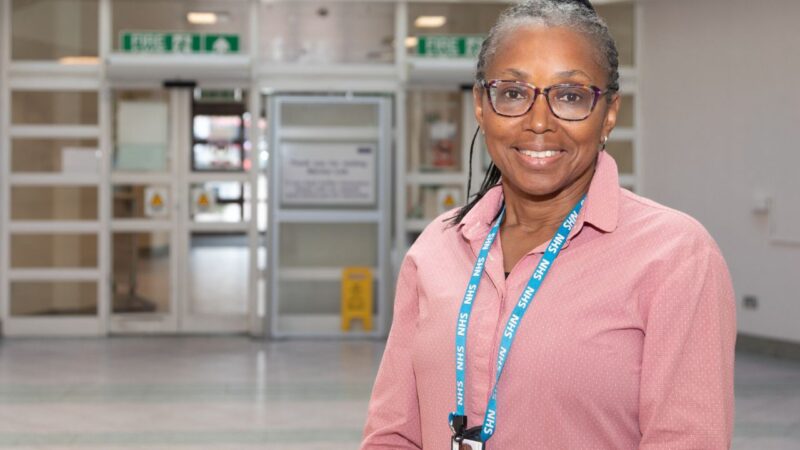Pharmacist Funke Lawal visits Merton’s housebound residents at home to review their medicines – and more besides. She joined Central London Community Healthcare six years ago to set up the service and loves the opportunity it brings to really talk to people, making sure they get the most out of their prescriptions.
When she’s not unravelling the mysteries of medicines to patients and their carers, this hockey forward is out on the field, laughing with her Merton teammates.
This interview is part of a series, going behind the scenes to get to know the people who keep NHS services working – in winter and beyond.
Meet Funke
Tell us about your job?
I carry out medication reviews for people who are housebound or socially isolated. They may be struggling to understand what their medicines are for or have had two or three hospital admissions related to not taking them correctly.
I have a chat with them. You pick up on a range of things – there may be environmental factors that are a challenge, social things we need to sort out before we tackle their medicines. Most patients, who get referred to me, have several health conditions and up to 20 different drugs. Together we work out what their priorities are, if there are any safety concerns; if there’s anything I can do to make things easier.
What’s a typical day like?
I would probably see one or two patients. At home, people are more at ease, more likely to open up. It is good to understand their journey and lived experience of healthcare and then work collaboratively to achieve the best outcomes. Sometimes they are on medicines for something they had 10 or 15 years ago or they don’t realise that medicines are having an adverse effect. We try and unpick that.
Sometimes housebound people are overdue blood tests so it’s about working with the GP to make sure that they get all those routine things. My focus is on the medicines, but it’s wider too. I can do some physical assessments – blood pressure checks, pulse checks that perhaps haven’t been done because someone couldn’t get to the surgery. I talk to social services if there are concerns about care packages, or the voluntary sector if someone is feeling isolated. Sometimes you see people in difficult situations, without enough heating, for example, and they don’t know how to get help – so it’s about signposting too.
How did you get here?
I became a pharmacist straight from university and haven’t thought of a career change. Most of my time has been spent in hospitals. I’ve done mental health, rehabilitation, acute … lots of different roles. I started thinking that working in hospitals, we never really understand what it’s like for people when they get home. I really wanted to work in primary care where I could have an impact on that.
This role came up, setting up the service, and it was ideal. There aren’t many pharmacists who do home visits, so it is quite unique. And it’s an opportunity to work with a wide range of professionals – dieticians, OTs, physios. It’s great to network and learn from these people and get them thinking about medicines a bit more.
Is there a patient who highlights how your job helps people?
I had a referral from social services about an elderly gentleman, who seemed to have a lot of medication at home. He’d had four admissions to hospital in three months all related to low blood pressure. When I spoke to him, he described himself as ‘old school’. He wanted to use up the medicines he had at home before starting new ones. Those old medicines were the ones causing low blood pressure. I explained why it was important to stick with the new ones and he totally got it. I asked if he had any other concerns and he said he wanted to give up smoking, so I did a referral for smoking cessation for him.
Tell us something not many people know about you?
I play hockey, I’m a member of Merton hockey club. Since university, wherever I’ve landed, I’ve found a club. It’s a nice way to exercise and it’s a very friendly club – it’s as much for the social side as the fitness.
What would you be doing if you hadn’t chosen this career?
I always wanted to work in health. At first, I wanted to be a physio, then I thought about medicine but I’ve always loved being a pharmacist. I’ve had different roles, that’s kept me enthusiastic. If not pharmacy, maybe it would have been public health. I think so many of the conditions we see are preventable so something to do with health promotion.
